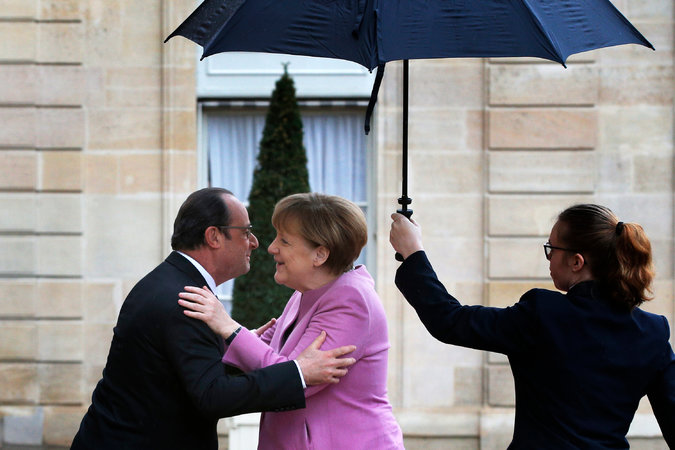
PARIS — The French-German couple has always been assumed to be the engine of the European Union, the crucial team at the heart of a sprawling, unruly family of 28 nations.
But in recent months, if not years, the tandem has become visibly lopsided. As Germany takes the lead on crisis after crisis — from the euro to migration — the question keeps popping up: Where is France?
“Why has France not stepped up to make the voice of Germany’s main partner heard, even as the migration crisis turns into a nightmare and threatens Europe’s very existence?” asked the French newspaper Le Monde on March 6, just as Chancellor Angela Merkel of Germany began a final push to make the migration deal with Turkey, which was reached Friday.
The reasons for France’s muted role on the migration issue are connected to domestic politics, said Pascale Joannin, general manager at the Robert Schuman Foundation, a think tank based in Paris that focuses on the European Union.
With one of Europe’s most stubbornly high unemployment rates and a far-right anti-immigrant party gaining popularity, France is in no mood to roll out the welcome mat for the migrants trying to make a home in Europe, she said.
Nor is France a top destination for most of the refugees and economic migrants now heading to Europe — a fact supported by the thousands who are huddling in northern France but trying against all odds to cross the English Channel to Britain.
“France and Germany do not have a common position on migration, which is one reason why Europe has been skating around the issue since last September,” Ms. Joannin said.
The gap was exposed in February, when Prime Minister Manuel Valls of France, speaking in Munich, knocked back taunts from the French news media that the country needed a Merkel of its own and challenged the chancellor’s open-arm policy toward the migrants, to the irritation of his German hosts.
Ms. Joannin traces the reluctance of the Socialist government to play a leading role in Brussels to a 2005 referendum on greater European integration that was defeated in France with the help of leading party members — including Laurent Fabius, who was foreign minister until last month.
“Fabius never did anything on Europe, nothing,” Ms. Joannin said. Furthermore, she added, President François Hollande, who as the Socialist leader presided over the party’s division in 2005, has proved at best to be ambivalent.
“This president does not have a passion for European affairs,” she said, noting the stark contrast with previous French presidents, who staked out a pivotal role in Europe with a close embrace of their German counterparts.
The French failure to take a leadership role has come at a cost for Germany, which lacks a strong ally within the European Union, but also, some argue, for the perception of the bloc within France.
“The truth is that France doesn’t organize itself, and it has never organized itself, so that its voice is heard” in Brussels, Sylvie Goulard, a French deputy to the European Parliament, said in an interview with the newspaper 20 Minutes.
That Germany should emerge as the dominant player in Europe owes much to its economic strength; that was clearly the case during the euro crisis.
France has a weaker hand, particularly because its budget deficit, one of the highest in Europe, continues to exceed European standards.
Mr. Hollande’s embattled political situation — weakened by a mishandling of crucial legislative initiatives that have divided his own party and brought protesters onto the streets — has only added to the view that France is losing ground as a voice to be reckoned with in Europe.
For that to change, Ms. Joannin said, “France has to say what it wants.”

